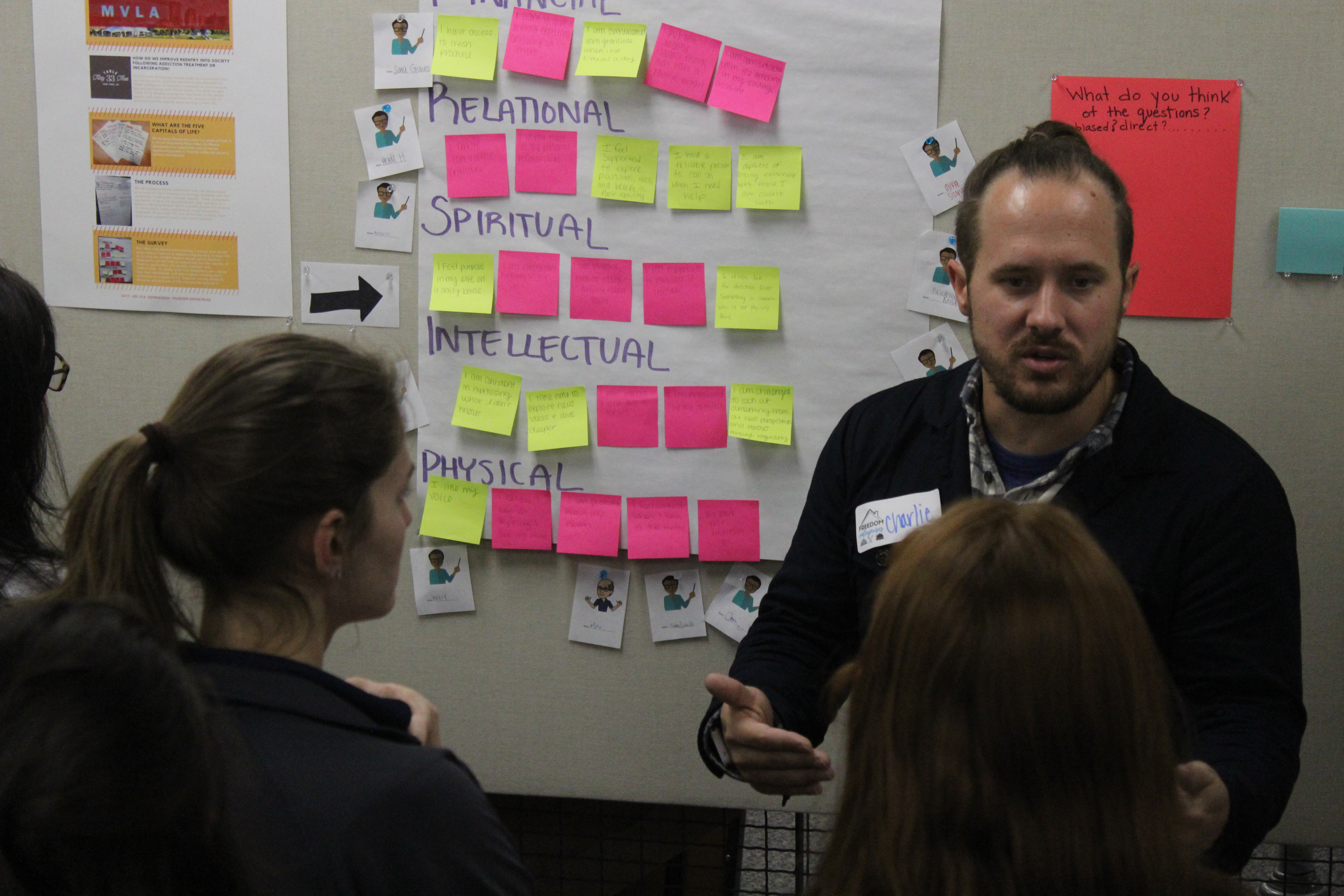IACT: Creativity for Tomorrow

Perspectives from the GEMnasium: Leigh Roberts
By Leigh Roberts '20
The Freedom Enterprise course is an ongoing learning experience for those involved in the Spring 2018 Gemnasium Grand Challenge and the IACT Summer Collaboration Accelerator which produced Freedom Enterprise: a workforce development strategy for people recovering from addiction and formerly incarcerated individuals. This course asks students to continue exploring the possibilities of the Freedom Enterprise ecosystem through an experiential blend of social entrepreneurship, dignified hospitality, and service practices.
Walking into my first Freedom Enterprise class as second year, IACT certificate student I was faced with a colossal question: how do we facilitate the re-entry of the formerly incarcerated and those recovering from addiction into society? As someone who could not even begin to understand the reality of someone in the criminal justice system who may struggle with addiction and gainful employment, I was immediately lost in how I could possibly help answer this question.
Addiction, incarceration, treatment, parole, re-entry. In the Dayton community, there is mad cycle for individuals struggling with opioid addiction and substance abuse in general. This is also the cycle that the Freedom Enterprise course seeks to disrupt and turn on its head. With the guidance of our educators from Miami Valley Life Alliance, City Church, and Table 33 our class looks to continue the work that came out of IACT’s summer Collaboration Accelerator program and promote positive workforce development.
While I may never fully understand the realities of someone who has attempted to re-enter into society, I do understand trust, empathy, communication and leadership. These words, among others, may play a key role in developing a stronger workforce development system. The Freedom Enterprise course recognizes that these concepts influence the five capitals of life. The “five capitals of life” refers to assets we possess that we invest in a variety of ways, primarily financially, spiritually, physically, relationally and intellectually. Our class focus is to analyze these five capitals and explore how we can implement positive growth by answering one question: where do you find poverty in your life?
For me, the easy answer is, I don’t find poverty in my life. However, there are no easy answers at IACT. When we really look at ourselves, are we happy with our physical and mental health? Are we passionate about the work we are doing? Do we feel genuine connections with the people we surround ourselves with?
In Freedom Enterprise we understand that poverty is not one-dimensional. To addresses these various forms of poverty, our class is creating a survey that assesses where an individual experiences poverty in their life. Next, we will analyze the results and use this survey to implement positive workforce development. In Dayton, this cycle of addiction, incarceration, and re-entry is getting larger, not smaller: More teens and adults are at risk, and more resources are needed to combat this epidemic. Our survey also aims to help businesses better understand where their employees struggle. Perhaps an employee is struggling financially or is unable to find the dignity in the work that they do. This survey is looking to help people of all socioeconomic levels better understand where there is space to grow.
Our class developed positive and inclusive statements that participants can rank themselves on a scale of 1 to 5 (1 being they completely disagree with a statement and 5 being they agree entirely). Examples include statements such as, “I am capable of being vulnerable with those I am closest to,” or “I make an effort to understand and be proactive about my finances.” The survey aims to garner information that benefits both workforce development and personal development and has the opportunity to address poverty on all levels.
The Freedom Enterprise course, to me, is the embodiment of humanity-centered design. Our class is creating a product that’s main goal is not profit but promotion of change. While our survey is a tangible item, the purpose of our deliverable is to help those who are caught up in the cycle of poverty. Every class I am continually inspired by my educators to give people a second chance and not allow their past struggles determine their future. There is much work to be done, but we are up for the task.
At the Institute of Applied Creativity for Transformation (IACT), our vision is to create a mindset of possibility that disrupts the world through 21st century citizenship. We believe in creative changemaking with a sustainable, humanity-centered focus that blends educational and vocational frameworks for self-determination and transdisciplinary transformation. For more information about IACT, call 937-229-5101 or visit go.udayton.edu/iact.
The GEMnasium, located on the fourth floor of Fitz Hall, is a collaborative “test lab” for UD students, faculty, and staff to experiment with new learning models while working as servant leaders for social innovation. To learn more and experience the GEM (Growth-Education-Mindset) for yourself, join us for our Summit Slam on December 10th, 2018 from 3:30p-5:30p.
